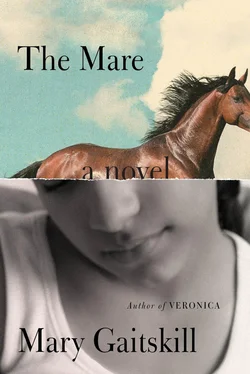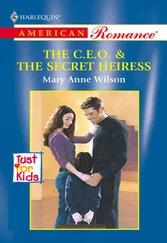See how nice she is, I thought.
But I could feel Strawberry thinking something different. I could feel part of her leaning toward Ginger and another part of her feeling very negative. Which didn’t make sense and did make sense at the same time.
Strawberry was not what I expected. She was a beautiful young woman with a wounded, contemptuous mouth and distant, wistful eyes. Of course she had been hurt; God, she must’ve been hurt. But that hot blend of hope and scorn that happened so quickly in her eyes — I was uneasy for Velvet and wished that she had picked another friend. I felt bad about it because of what Strawberry had been through. But still. I wasn’t sure I wanted her around.
We walked out with Ginger and then she said good-bye to me. She kissed me on the head in front of them. She smiled at them like…I don’t know, it felt like a funny bone. They said good-bye to her. And then they didn’t say nothin’. I was thinking they’d crack on her, and I didn’t know what I’d do, stick up for her or crack too. But they didn’t. We just walked for a while, quiet. Then Strawberry started cracking on this boy who kept wanting to mess with her, touch her, also on this teacher who stared at her, and then Alicia talked about this boy she liked, Dominic. I said, “Is he in high school?” She said, “I don’t think he goes to school.” I said, “I think I know him.” Strawberry looked at me. And they got quiet again.
Right when the class got out, when all the kids were milling around, Ms. Rodriguez introduced me to the school social worker, a woman named Eliza Lopez. She had a deep, good face and she seemed very happy to meet me. She thanked me for “making a difference.” In the noisy hall, I tried to express some of my doubts and fears; I wondered about how Velvet’s mother felt about it all, worried that I couldn’t understand her. Ms. Lopez’s face darkened. “I wouldn’t worry about that,” she said. “That woman is like a brick wall. Nobody can understand her.” And then Velvet was there with her friends.
“Here’s my card,” said Ms. Lopez. “Call me any time.”
And I went back out through the metal detectors. Wondering what it would be like to be eleven years old and to walk through that thing every day with a guard watching.
It was a few days after that that Ms. Rodriguez picked my paper to read out loud in class. And when she was done, this boy in front named Junior said, “That’s good!” And I felt my face blush and I smiled and my head went to one side. Somebody whispered, “Look at her!” and I put my head normal and saw Alicia and them staring knives at me. Strawberry looked at her nails. Ms. Rodriguez said, “I’m proud of Velvet for all the hard work she did.” “Bitch,” whispered Alicia. Ms. Rodriguez didn’t hear. She came and put the paper on my desk. “Velveeta cheese,” said somebody else. “Flat-ass fathead.” “Douchebag.” Strawberry kept looking at her nails.
I thought the visit to the school was good. But after, things got worse. Velvet still did her lessons with me. She worked hard: First we would discuss the book she was supposed to write about, getting her focused on what she wanted to say about it. She would then write a draft and revise it after my critique. But every time I asked her what grade she got on it, she said she hadn’t gotten the paper back yet.
Finally I called Ms. Rodriguez, who told me that Velvet had stopped doing any homework at all. She said her discipline problems had escalated too. I could hear the irritation in her voice; she sounded irritated with me as well as the girl. “You have to understand, you can only have a very limited impact. It’s really up to her, and if she doesn’t want to, there’s nothing you can do. Ma’am, this girl has a lot of problems.”
“But she’s doing the work,” I said.
“I’m not seeing it.”
I talked to Velvet and she said the same thing she’d said before, that the teacher hated her and lost her papers. She continued to do work with me on the phone, good work. So after a few weeks, I called the teacher again.
“You need to understand something,” she said. “This is a very manipulative kid.”
When Ginger called me, I told her I did give Rodriguez my papers. I wasn’t lying, because I did them, I did the papers and I took them to school. Besides it was true, the other thing I said; Rodriguez hated me and I knew my report card would not be good. So did my mom. She said, “You’re a dumb girl trying to be smart. You don’t think I tried too? I worked, and I still got failed and you will too. You’ll see. That kind of smart won’t help you anyway.”
We were watching her favorite show, and I was kneeling on the floor rubbing her legs and her feet while she told me how shitty everything was, especially me. She gets what she deserves, Carmencita. Just you wait!
“Ginger is nice, but she’s foolish. She doesn’t know where you live. She doesn’t even know what it’s like to get up in the morning and take the bus to work — ah, there he goes again!” She meant the cheat Santiago, he was giving this girl a flower and saying, Walk across a piece of paradise with me. Beautiful music played; he was engaged to be married, but the music was on his side. My mom said, “More on the other foot,” and the scene changed to Santiago’s girlfriend’s mom taking painkillers. For a while I just rubbed and we watched, then my mom started again. “She’s got no kids and has to borrow somebody else’s and I don’t know why she picked you. Probably she feels sorry for you. Well, I feel sorry for her. So be nice to her. Show her manners, respect her house. Don’t let her see what you’re really like. If she wants to buy you things, let her. Give you money, even better. Make her happy, maybe one day you’ll get an inheritance. A woman like that — ow! Not so hard, idiot!”
“I’m sorry, Mami.” I rubbed her foot like I rubbed my mare and I felt her soften, like scared little hairs coming alive one by one.
“A woman like that, what kind of woman?”
“Aren’t you listening? I’m telling you what she’s like! She has money, but she’s empty inside.” I would’ve loved to have known Papa — what was he like, Sylvie? Was he affectionate? “Well, bless her, at least she’s trying. At least she’s trying.”
I rubbed and we watched, not talking for a while.
I let her come again anyway. What could I do? I wanted it so badly, and also it seemed wrong to punish her when I knew she had been doing actual work. A casual acquaintance backed me up on that, a woman named Robin, Kayla’s friend, a single mother who’d adopted a three-year-old Romanian child she’d named Jewel, a girl who was half out of her mind when she’d arrived and who, at five, had revealed herself to be preternaturally bright. “You need to give her something to hope for,” said Robin. “Even if she can only meet you halfway, she’s got to know you’re always there, believing she can do it.”
We had the conversation at a dinner at Kayla’s house, a big spread on her long wooden table. It was me and Paul, Robin and the five-year-old Jewel, plus Kayla’s grouchy sixteen-year-old, Jenny. It was festive and lovely. There was music on, and I thought, We could have this, too: children at the table. We could have Velvet’s friend up. We could have maybe her mother and brother. Jewel looked up suddenly, and fixed me with penetrating adult eyes. I had seen this look on her before; it was curiously natural on the little girl. “Why do you like this girl from another family to come see you?” she asked.
Читать дальше












